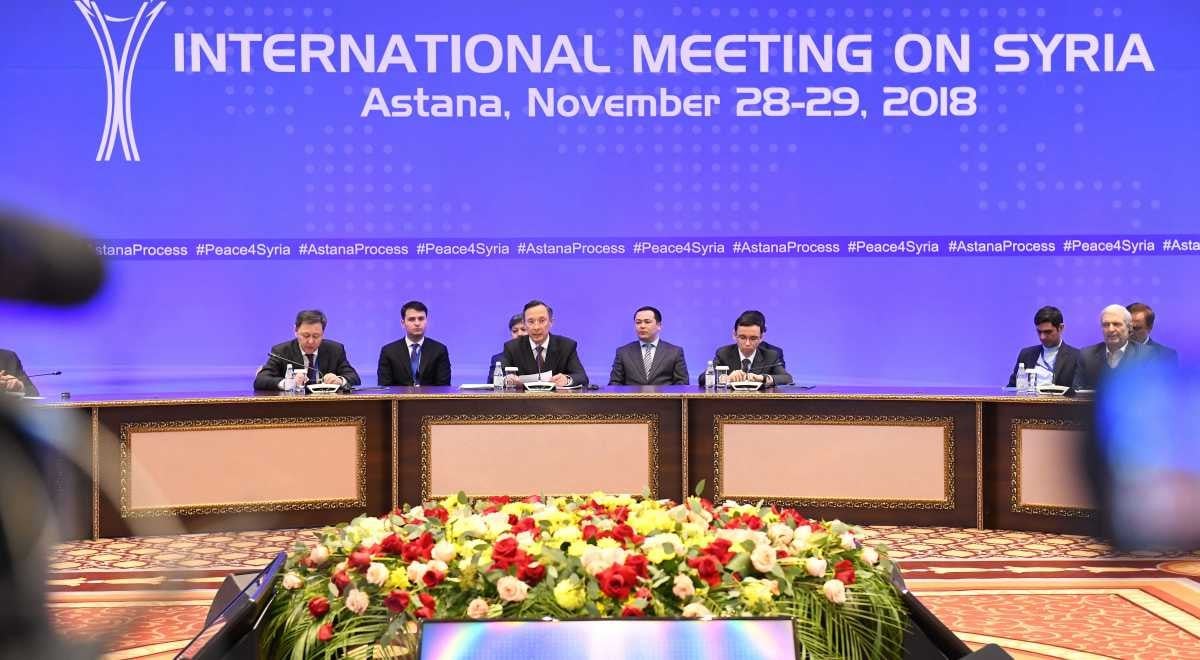In the statement, the three guarantor states of a ceasefire regime in Syria, reaffirmed their determination to step up joint efforts to launch a Committee in Geneva tasked with drawing up the Arab country’s Constitution.
The three states reiterated that the new Constitution will enjoy support of the Syrian parties, and comply with the decisions of the Syrian National Dialogue Congress in Sochi. They also decided to intensify their consultations on all the levels to finalize its establishment at the soonest possible time.
The statement was released following intensive talks between the top negotiators of the three countries and the UN special envoy for Syria, Staffan de Mistura, in Astana.
Hossein Jaberi Ansari, a special assistant to Iran’s foreign minister, Turkish Deputy Foreign Minister Sedat Onal, and the Russian president’s special envoy for Syria Alexander Lavrentiev represented their countries in this round of negotiations.
What follows is the full text of the joint statement:
Joint Statement by Iran, Russia and Turkey on the International Meeting on Syria in Astana
(28-29 November 2018)
The Islamic Republic of Iran, the Russian Federation and the Republic of Turkey as guarantors of the Astana format:
1. Reaffirmed their strong commitment to the sovereignty, independence, unity and territorial integrity of the Syrian Arab Republic and to the purposes and principles of the UN Charter;
2. Highlighted that these principles should be universally respected and that any action that might violate them and undermine achievements of the Astana format should be avoided;]
3. Rejected all attempts to create new realities on the ground under the pretext of combating terrorism and expressed their determination to stand against separatist agendas aimed at undermining the sovereignty and territorial integrity of Syria as well as the national security of neighboring countries;
4. Discussed the current situation on the ground in Syria, took stock of the recent developments following their last meeting in Sochi on 30-31 July 2018 and underscored their determination to strengthen their trilateral coordination in light of their agreements;
5. Examined in details the situation in the Idlib de-escalation area and reaffirmed their determination to fully implement the Memorandum on Stabilization of the Situation in the Idlib De-escalation Area of 17 September 2018. In this regard they expressed their concern with the ongoing violations of the ceasefire regime, and declared that, as guarantors of the ceasefire regime, they would step up their efforts to ensure observance with it, including by enhancing work of the Joint Iranian-Russian-Turkish Coordination Center. They stressed the importance of a lasting ceasefire while underlining the necessity to continue effective fight against terrorism. They also emphasized that under no circumstances the creation of the above-mentioned de-escalation area should undermine the sovereignty, independence, unity and territorial integrity of the Syrian Arab Republic;
6. Reaffirmed their determination to continue cooperation in order to ultimately eliminate DAESH/ISIL, Nusra Front and all other individuals, groups, undertakings and entities associated with al-Qaeda or DAESH/ISIL as designated by the UN Security Council. They called upon all armed opposition groups in Syria to completely and immediately dissociate from the abovementioned terrorist groups;
7. Strongly condemned any use of chemical weapons in Syria and demanded that any reports in this regard should be investigated promptly and professionally in full compliance with the Convention on the Prohibition of the Development, Production, Stockpiling and Use of Chemical Weapons and on Their Destruction and by the OPCW as the main international competent authority to establish use of chemical weapons;
8. Underlined their firm conviction that there could be no military solution to the Syrian conflict and that the conflict could be resolved only through the Syrian-led and Syrian-owned, UN-facilitated political process in line with the UN Security Council resolution 2254;
9. Reaffirmed their determination to step up joint efforts to launch the Constitutional Committee in Geneva, that would enjoy support of the Syrian parties, in accordance with the decisions of the Syrian National Dialogue Congress in Sochi and decided to intensify their consultations on all the levels to finalize its establishment at the soonest possible time;
10. Welcomed the successful development of the “pilot project” within the framework of the Working Group on the release of detainees/abductees and handover of the bodies as well as the identification of missing persons. The release of the detainees on 24 November 2018 constituted a step forward in implementing confidence-building measures between Syrian parties to contribute to the viability of the political process and normalization of the situation on the ground. In this regard they reiterated their commitment to further advance the efforts of the Working Group;
11. Emphasized the need to continue all efforts to help all Syrians restore normal and peaceful life as well as alleviate their sufferings. In this regard, they called upon the international community, particularly the United Nations and its humanitarian agencies, to increase their assistance to Syria by providing additional humanitarian aid, restoring humanitarian infrastructure assets, including water and power supply facilities, schools and hospitals;
12. Highlighted the need to create conditions for the safe and voluntary return of refugees and internally displaced persons (IDPs) to their original places of residence in Syria. They reaffirmed their readiness to continue interaction with all relevant parties, including the Office of the United Nations High Commissioner for Refugees (UNHCR) and other specialized international agencies, in particular in the context of rendering assistance to preparing and convening the International conference on Syrian refugees and internally displaced persons (IDPs);
13. Expressed their appreciation to Mr. Staffan de Mistura, the UN Secretary-General Special Envoy on Syria, for his efforts to seek peaceful solution for the Syrian crisis and for his constructive interaction and cooperation with the Astana format during his mission;
14. Expressed their sincere gratitude to the President of the Republic of Kazakhstan, His Excellency Nursultan Nazarbayev and the Kazakh authorities for hosting in Astana the 11th International Meeting on Syria;
15. Decided to hold the next International Meeting on Syria in Astana in early February 2019.
